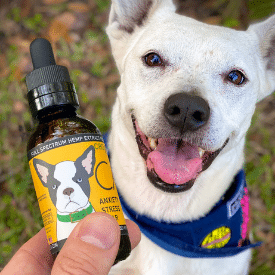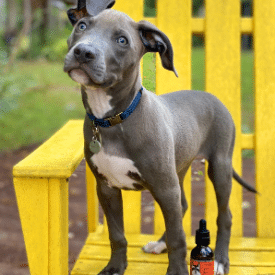Eucalyptus Oil for Dogs: Is it Safe?

Eucalyptus is more than just the main source of food for koalas, it’s a powerhouse plant loaded with amazing compounds that have many healing properties that can benefit your pet. Unfortunately, when you try to research this oil and its benefits for our pets, there is a lot of misinformation and rumors being spread. So let’s dive into this amazing plant, the different types and their benefits, safety of eucalyptus oil for dogs, and how to choose the right kind for your pet.
What is Eucalyptus?
Eucalyptus is a type of fast-growing tree mostly native to Australia. Its leaves and oil have been chewed and eaten, and its oil has been applied to the skin for centuries. Eucalyptus is widely regarded as a wonderful flea and tick repellent, disinfectant, skin soother, odor eliminator, and respiratory therapy. The main medicinal compound in Eucalyptus is 1,8 cineole, also known as eucalyptol. This compound is responsible for most of the respiratory benefits we commonly associate with Eucalyptus. It has also been researched to have numerous anti-inflammatory and anti-oxidant properties. The other important compound in the plant, called Piperitone, another monoterpene that is found in many wines and has decongestant and diuretic properties.
Species Of Eucalyptus:
Eucalyptus is an all-encompassing name, as there are several species of this plant. Types include:
Eucalyptus Blue (Eucalyptus bicostata)
Native to Ecuador, this is the milder type of Eucalyptus and is commonly used for insect repelling purposes. Its safety in pets has not been well researched, so it’s best to avoid this oil for use on or around pets to err on the side of safety.
Lemon Eucalyptus (eucalyptus citriodora)
As its name implies, this type of Eucalyptus has a lemony scent, and is even more powerful an insect repellent due to its due content of PMD (p-Methane-3,8-diol). In research it’s been shown to rival DEET in its insect repellency. This type of Eucalyptus works well as an aromatic mist for bugs and is considered safe around all species, when diluted appropriately.
Eucalyptus Dives
Commonly called Peppermint or Broadleaf Eucalyptus, this oil is much lower in 1,8-cineole, and therefore has few safety issues associated with it. Although it lacks a large amount of eucalyptol, it is rich in Piperitone, so it still has respiratory benefits associated with it. However, it has not been well-researched in pets so it’s best to stay away from this type until more research can prove its efficacy and safety for pets.
Eucalyptus Globulus
The most popular type, Eucalyptus Globulus is indicated for respiratory conditions like asthma, bronchitis, fungal conditions, influenza, internal parasites, and insect repellent. It contains high levels of 1,8-cineole, so be careful using the undiluted (neat) oil near children or asthmatic individuals. However, when properly diluted, it has been well-researched to help those with asthma. This oil is also a wonderful air purifier and cleanser.

These are some of the many reasons that this species of Eucalyptus is our choice for our Remedy Salve, formulated with eucalyptus oil for dogs. Our REMEDY Salve for Dogs, blends Eucalyptus oil with Full Spectrum hemp extract oil, MCT oil, hemp seed oil, arnica oil, and peppermint essential oil to give your pet the topical relief they need from a wide variety of painful conditions and ailments.
Eucalyptus Polybractea
This Eucalyptus is high in eucalyptol, and is similar to Eucalyptus Globulus in its constitution, use, and safety. This type is also reported to be indicated for the treatment of urinary tract infections, herpes infections, respiratory issues, and as all types of Eucalyptus do, it’s a great insect repellent.
Eucalyptus Radiata
Like Eucalyptus Globulus, Eucalyptus Radiata is high in eucalyptol, and can usually be used interchangeably with E. Globulus. E. Radiata is used for infections, asthma, vaginitis, bronchitis, sinusitis, and viral respiratory conditions. Just like E. Globulus, it has wonderful air purifying and cleansing properties.
Is Eucalyptus Oil for Dogs Safe?
Yes, Eucalyptus (specifically Eucalyptus Globulus), when sourced, formulated, and diluted properly is quite safe. The safety of Eucalyptus is widely debated on the internet, but unfortunately most of the information you’ll find on its supposed toxicity is based on blatant misuse (such as using the oil undiluted or using way too much oil) and using oils of low purity, potency, or quality.
Finding true toxicity data and/or reports is difficult, and most information is based off anecdotal accounts and not actual documented toxicity reports. Also, these anecdotal accounts of toxicity lead back to people using synthetic, poor grade oils, not high-quality pure oils. This can confuse the average consumer and cause undue fear, as is the case with many natural remedies that have been demonized unjustifiably. Eucalyptus has a plethora of benefits. Just as with many essential oils, the amount of misinformation found on the internet leads to a wider sense of fear that is largely unnecessary when it comes to plant medicine.
With so many popular plant medicines on the market, choosing a high quality product is going to ensure a safer outcome, whether it’s being used on yourself or your pet.
We have found great success with safely using Eucalyptus oil in our Remedy Salve. As with any essential oil, using the oils at the proper dilution, and from a quality source and formulator is key. Because Eucalyptus is such a powerful healing plant, a little goes a long way. If you’re unsure of the quality and safety of any essential oil, consulting with a knowledgeable professional is a great idea.
Sourcing Eucalyptus Oil For Dogs
The source and method of extraction are imperative when choosing a good quality Eucalyptus oil. Buying any product from an unknown source is always a risk, but when it comes to essential oils being used on and around our pets, one must pay close attention to the source of their oil product, and its potency. Just like food, when an animal is suffering due to low quality food, we switch them to a better-quality food and see benefits.
The same is true with essential oils, sourcing is everything. Understanding how to evaluate the grade of oil in a product is key, since there is little regulation with essential oils. For this we love to use the queen of all things EO, Dr. Melissa Shelton DVM. Consulting her manual, the Animal Desk Reference, is a great way to really understand essential oils from a factual, science and data driven standpoint from someone who understands how different species metabolize essential oils.
We see unbelievable results from pet parents using our Remedy Salve on their dogs and horses, proving to us just how beneficial this form of plant medicine can be in the battle against lumps and bumps like infections, cysts, and tumors. Eucalyptus has a wide variety of benefits for all species, most notably its respiratory and anti-tumor properties, making it an excellent choice for aiding with many common ailments in ourselves and our pets.
When properly diluted, Eucalyptus can be mainly considered safe (given you are using the correct species of Eucalyptus) for most animal species. Generally speaking, it is not as friendly to felines when used topically. Therefore, we do not typically recommend using Remedy Salve on cats. The safety of this oil for dogs has a lot to do with the manner in which you use it, like most medicines. It’s always a good idea to have a chat with your integrative veterinarian and see if eucalyptus would be a good addition to your dog’s health routine.
As with all essential oils, keep the oils out of reach of pets, and in case of undiluted ingestion, contact your vet right away.
References:
- Anti-inflammatory properties of the monoterpene 1.8-cineole: current evidence for co-medication in inflammatory airway diseases
- Animal Desk Reference II, Dr. Melissa Shelton
- Eucalyptus globulus Labill. decoction extract inhibits the growth of NCI-H460 cells by increasing the p53 levels and altering the cell cycle profile
- New Insights into the Biological Properties of Eucalyptus-Derived Essential Oil: A Promising Green Anti-Cancer Drug













